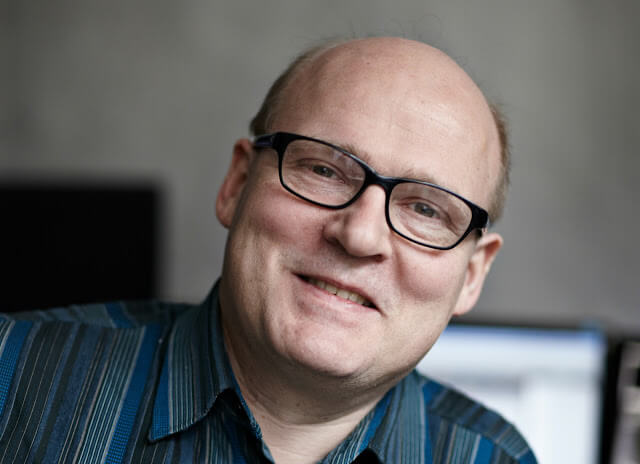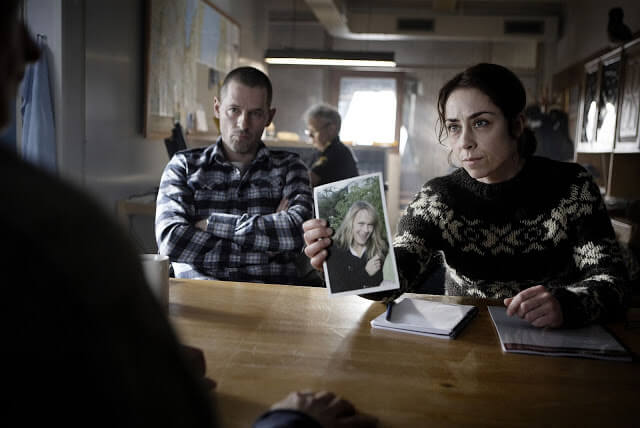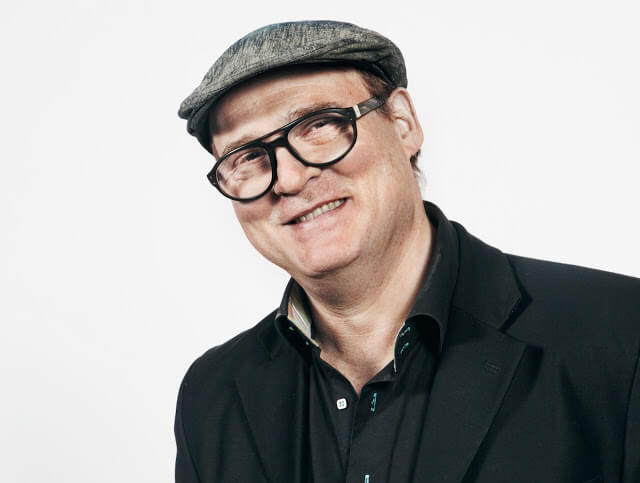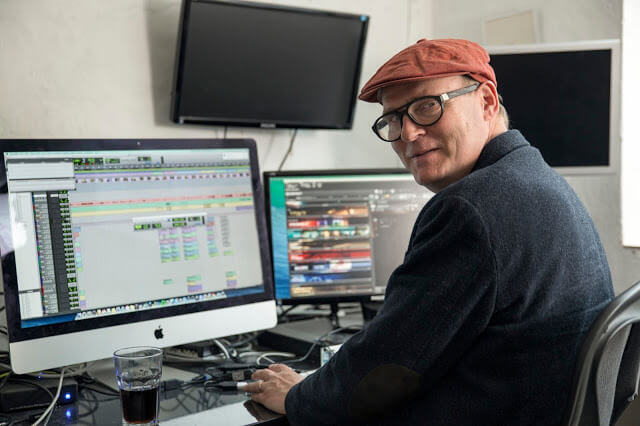From Wallander to The Killing, these often bleak tales have found their way onto television schedules in countries which have traditionally been resistant to subtitled fare. Regional remakes of these films and series have cropped up too and the fingerprints of these European dramas are found throughout many of the shows which have tried to ape their arid and austere styles.
One of the key factors in the success of each of the Scandanavian series stem from their desolate mood and tone - cultivated, in part, through the evocative use of claustrophobic sound and gripping music. As such, I was eager to speak with Danish composer Frans Bak; a man best know internationally for his absorbing compositions featured in the likes of The Killing, Lilyhammer and the Scandanavian-inspired UK TV series Doctor Foster. I hope to understand what it is in these stark European creations that the rest of the world has responded to so positively.
To truly create a great score, I imagine, it has to be essential to really place one's self in the middle of the film or show's world and to capture the feelings of residing there. For Bak, a man who has written soundtracks set in the darkest shadows of humanity, of shows featuring gruesome murder and mysterious suicides, mendacious adultery and appalling lies, I wonder how much of a spiritual toll visiting these grim and ominous places would take on him.
Bak, it transpires, is living testament to the fact that to successfully conjure darkness one doesn't have to be embroiled in misery or trauma at all. I ask if the process of composing for these harrowing scenes is as emotionally taxing as I'd assume. As the composer reaches for an answer to my question, it is clear that he sounds the opposite of a tortured artist. "Ah well, not that much! No, not that much..." he begins, chuckling lightly as he speaks. "Maybe, I don't know! That's a good question! Maybe. I don't know!"
Bak begun his career as a musician at a young age - "You know these annoying kids in school who always knows how to do things better themselves? I'm one of them!" - and has since developed a portfolio across decades spanning everything from Oscar-nominated shorts through to American reality TV shows and, of course, the European features his international reputation is built on. In our conversation, the main thing that strikes me about him is how entirely un-jaded he is, how completely devoted to and how infinitely, and unconditionally, in love with music he seems.
As in my recent interview with Dana Lund , I find myself discussing the challenges that come with writing music and the hours of solitude that stem from trying to craft perfection. Bak speaks with a warmth which radiates from his throat as he recalls his method of bringing a soundtrack to life - from the hours spent playing alone, arduously building up layers of sounds on Pro Tools, to the blossoming of a finished, fully recorded piece.
"Sometimes it's very lonely but I like the process very much. Its interesting when you're recording with a symphony orchestra, or whatever you record with, to hear your ideas in full..." His tone is earnest, yet understated, as he concludes sincerely: "I like that very much."
It only takes a few seconds of conversation with Bak for it to become impossible to imagine him doing anything else with his life other than writing music. Melodies and harmonies, I imagine, flow through him - a suspicion which seems to be confirmed when we move to the topic of his compositional methods.
"To be honest," Bak informs me, "sometimes I start in the shower. I wake up in the morning and [think] 'today I'm going to do this and this'. Then I go in the shower and suddenly ideas pop up and sometimes I have actually composed themes in the shower. And then I can just record them on my iPhone and have some breakfast. Then I know what to do today."
I ask what he believes makes for a good score, how he knows the melodies which run through his mind as he stands under running water are suitable for the projects he's working on.
"Its always about capturing the story," Bak tells me. "You have to be able to help tell the story. So if you can find elements in this music that helps telling the story that's always interesting." The Dane puts this philosophy at the center of all his writing, above choice of instrumentation and all else. "It doesn't matter if its a symphony orchestra or its a little tiny mandolin or whatever it is, just - does it tell the story? That's the most important thing."
Returning to Bak's writing for thrillers we discuss The Killing - the Danish original and the American remake for which he provided the music to both. Having worked in multiple countries across the globe, I wondered if the audience he was writing for would effect his style - are his compositions influenced by the country a film or TV show originates from?
The musician ponders my question - "It could be," he speculates, before providing an anecdote on one further adaptation of The Killing. "Actually, I made the Turkey version also. We used some Turkish instruments." Unfortunately, he notes that whilst "that was very fun project to do", the show ultimately wasn't overly successful. "It didn't turn out that good. They only made five episodes but it was fun to work there."
At this point, I note that, having adapted the same source material multiple times, it must be an incredible challenge to keep one's ideas fresh - how is it possible to innovate in such a way? In this instance, Bak states, he was hired as the writer for the American show not because they necessarily wanted him to re-invent the wheel, but because "they liked the Danish version a lot and they wanted me to be a composer and they liked me to work on the themes we had in the Danish [version]."
The process for creating music for the American iteration of The Killing, however, was incredibly removed from a simple note-for-note regurgitation of compositions Bak had previously penned. They did, however, ask him to write using his pre-existing themes. "So," the writer clarifies, "that's what I did but then it changed a lot in [season] four - the music evolved a lot, it ended up in a different place but we started with the same themes we had in Denmark."
I question what elements from the Danish score are the ones that resonate so deeply with those who hear it? Why, I wonder, were the American commissioners so keen for Bak to create a new score based around this pre-existing work?
"I don't know" is Bak's simple response. "I think that maybe we [European composers] don't play exactly what's happening in the picture, we play the feelings of actors." The composer responds affirmatively when I ask if he's more interested in representing the internal life of the character rather than the events occurring in a show or film's mise-en-scène. "I think that's maybe a way we do in Europe - we focus on the thoughts of the players instead of the actual happenings in the movie. You don't have to tell everything that's happening in the picture, some things you have to leave to people's imagination."
Indeed, when I ask what attracts the composer to potential projects to work on Bak refers back to the inner being of the characters in scripts he is presented with; the musician tells me it is essential that he empathises with the people in the film or the narrative itself. "Does the story appeal to me?" Bak rhetorically procrastinates out loud in his rich Danish accent. "I always like it when you have a main character and something happens to this person and he or she changes and ends up in another place - something's happening. I like it when I can relate to [the script] in some way."
It is no surprise, then, to note that, aside from the darker material he is best known internationally for, the jovial Bak creates pieces in a multitude of different genres. "When I work in Denmark," he states, "I do other things like comedy." Men & Chicken, a darkly humorous feature directed by Anders Thomas Jensen, is a great example of this.
It is telling, too, that when he takes my call, Bak is in a rather unusual location. "Right now, crazy enough, I'm in a circus - I'm in a circus caravan right now!" The attraction in question, Zirkus Nemo , is, I'm told, rather popular in Denmark and this is not the first time the composer has found himself involved with the show. "I've been writing music for that for many years. Every summer I just come here for a couple of days and I've written the music."
For someone associated with the darkest of series, its a delight to hear Bak speak joyfully about the thrill of writing for the circus or penning songs for comedy films. It's an illustration too, of his versatility. "I don't think I have a particular style. That's the way I work."
The one common thread that does seem to flow through his work, and our conversation too, is passion - an all-encompassing passion for music in all its guises. This is a man who has an ambition to work only on the films and series which engage him the most intellectually and emotionally: "I don't have a dream project I'd like to work with, like Terminator 6 or something like that," he informs me. "I don't work like that".
Instead, Bak is excited to tell me: "I'm working on a project right now. I call it Sound Of North - and that's a band I made with a string quartet and soundscapes and a Swedish singer and that's very interesting; we played one concert." He speaks with the admirable and unbridled enthusiasm of a man blessed enough to have never become cynical or weary of his profession - its a pleasure to listen to his speak this way. "I just made an album that's coming out on Mercury Classics . So that's very interesting. In the future I hope to play more concerts with this project and combine it with my composing work for films."
I ask too about Doctor Foster, the smash British TV series which is debuting in America at around the time of our call. Its international success means the show has been commissioned for a second outing - is this something Bak will be working on I ask? His reply is honest and buoyant - two adjectives which sum up the composer rather well. "I hope so!" I ask if he's just waiting for the call; he chortles and confirms this is the case.
I wrap up our interview by asking Bak what the favourite piece of all his compositions may be. "I don't know... but of course the Danish version of The Killing was the one that opened the doors for me internationally so of course I have a special thing for that."
There is a pause and a moment of laughter before our conversation concludes with a rather wonderful caveat: "But.... I've done a lot of strange things."
Thank you
I'd like to take this opportunity to offer my gratitude to Frans Bak's generosity and graciousness with his time and for discussing his work with me. His conversation was enriching, charming and an inspiration.You can find out more information on the composer at this website: http://fransbak.com/
A selection of his works are also available to listen to on his Soundcloud and can be heard on
Doctor Foster which debuted on American television on the Lifetime Network on April 10th and
Men & Chicken which is due for an American release on April 22nd.





No comments
Post a Comment